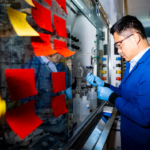About Ke Zhang
The Zhang lab research is highly interdisciplinary. While our core research is polymer chemistry, we utilize a range of organic reactions, colloidal syntheses, and bioconjugation techniques to access our synthetic targets. Unlike those of an organic chemist, our targets are usually much larger, oftentimes large enough to be visualized by electronic or atomic microscopy (tens to hundreds of nanometers). For example, one of our synthetic aims involves a mimic for a virus capsid which we intend to use as preventive or therapeutic vaccines. Another target of ours is a nanoscopic drug carrier that can release drug molecules at specific times or as an external trigger is applied. These systems will require careful designs: design for connectivity and assembly, design for materials functionalities such as degradation, release, membrane disruption, and encapsulation, and design for biomolecule interactions in particular cell and tissue targets. Students and postdoctoral fellows will gain experience in organic and colloidal syntheses, polymer chemistry, and nanotechnology, while being exposed to interdisciplinary science. From a strategic perspective, it is expected that synergistic combinations of polymer chemistry, bio-, and nanotechnology are likely to remain as priority areas for the foreseeable future in both academia and industry.
The Institute develops imaging tools to highlight chemical processes – enabling clinicians to better diagnose and treat disease.
Northeastern University Center for Renewable Energy Technology focuses on carbon-free technologies which are sustainable from materials and techno-economic point of view.
The Zhang group develops macromolecular systems to provide answers to important questions in biology and medicine.
Publications:
-
Google ScholarRead


